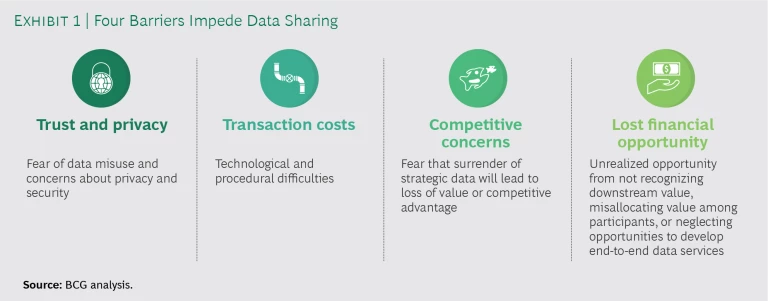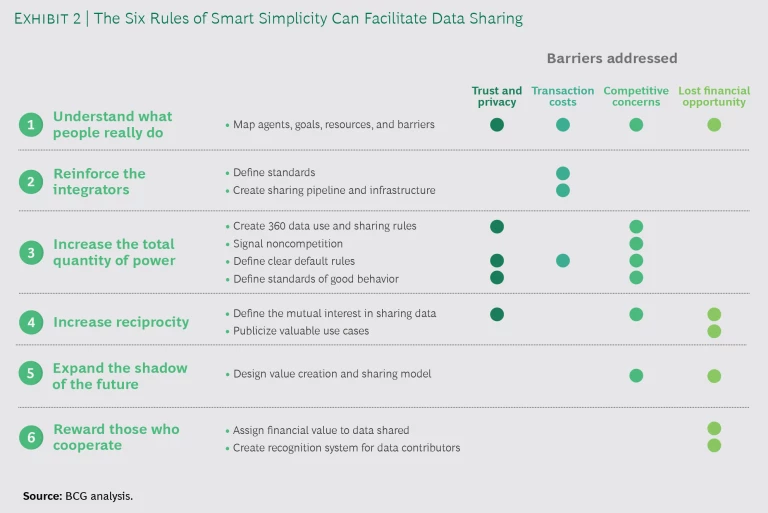This is the sixth article in a multipart series.
As big companies explore new revenue streams and business models based on data, they quickly run into a quandary. On the one hand, combining the data they control with data from other sources significantly increases the number and value of potential available use cases. On the other, that same act of data sharing opens up issues of trust and misuse, lost value, and unrealized opportunity. In many cases, the potential risks (which tend to be more readily identifiable) appear to outweigh the prospective rewards (which are often more distant and uncertain), and the companies proceed no further. This is unfortunate, understandable, and unnecessary.
Data sharing—particularly the exchange of the exploding quantities of data generated by the Internet of Things—has emerged as an important and high-value commercial activity. It can help advance new business models, drive innovation, and tackle some of society’s most pressing challenges, such as making cities more efficient and livable. Data sharing is facilitated by data ecosystems comprising multiple parties within and outside of an individual company’s industry. These ecosystems can overcome some major barriers to data sharing, including the unclear value of data at the point of generation and the need for collective intelligence to identify and match participants with opportunities for value creation. Broadly, data ecosystems are important vehicles for aligning companies around common goals while giving them the agility needed to innovate.
For the orchestrators of data ecosystems—which can be tech companies, large industrial incumbents, or innovative startups—the stakes are high: if other companies are not willing to share their data, the ecosystem dies on the vine. Still, many companies continue to hoard their data—to their own detriment and that of the ecosystem as a whole.
Simple and effective rules of governance can help break the data gridlock. But in the face of many possible design choices, companies don’t always know where to start. A good first step is to understand that data sharing in an ecosystem is fundamentally an issue of cooperation, with rules guiding good behavior and setting the terms of engagement. BCG’s Smart Simplicity framework , which is designed to help companies make sense of organizational complexity and encourage cooperation, can help.
READ THE OTHER ARTICLES IN THE SERIES
- Innovation, Data, and the Cautionary Tale of Henrietta Lacks
- Contact Tracing Accelerates IoT Opportunities and Risks
- The Risks and Rewards of Data Sharing for Smart Cities
- What B2B Can Learn from B2C About Data Privacy and Sharing
- How Far Can Your Data Go?
- Europe Needs a Smarter, Simpler Data Strategy
- Sharing Data to Address Our Biggest Societal Challenges
- Where Is Data Sharing Headed?
- The New Tech Tools in Data Sharing
The Sources of Data Gridlock
Our research and client experience show that problems with data sharing generally revolve around four issues: trust and privacy, transaction costs, competitive concerns, and worries over missed or lost financial opportunity. (See Exhibit 1.)
- Trust and Privacy. This barrier is rooted in the fear that data will be mishandled, misused, or mis-shared. Poor technology, weak governance, and actual data breaches can all lead to data being used for purposes that were not agreed upon by the originator of the data and others in the ecosystem.
- Transaction Costs. These costs underlie every data exchange, and problems can be both technological and procedural in nature. Technological impediments include poor connectivity, mismatched standards, and constraints on interoperability. Procedural barriers can involve mismatched skills, organizational complexity, or ambiguous rules. Technological advances such as 5G mobile connectivity, better industry standards, broker platforms, and data fusion tools are emerging to tackle the former. Sharing governance can tackle the latter. But as more heterogeneous IoT data comes online, new challenges are likely.
- Competitive Concerns. The data landscape is still mostly unmapped, and new, unforeseen use cases appear every day. Companies rightly fear surrendering competitive advantage along with strategic data. Incumbent contributors to an ecosystem may worry that competitively sensitive information will be released to rivals. New digital entrants may worry about digital giants copying their tools or poaching their talent. All participants may worry about ecosystem orchestrators capturing a disproportionate portion of the value.
- Lost Financial Opportunity. Another ramification of the unmapped landscape is the possibility that sharing data may cause financial opportunities to be overlooked. This could result from a failure to recognize data’s downstream value, from misallocation of value among an ecosystem’s participants, or from neglected opportunities to develop end-to-end data services internally. For example, vendors and customers can work together to coordinate logistics, rationalize inventory, and even codesign products, but the benefits and investments may not accrue evenly across the supply chain.
If the barriers to sharing are sufficiently high, they will cause data gridlock. A 2018 European Commission study found that of 129 companies surveyed, 60% did not share data with other companies and 58% did not reuse data obtained from other companies. When gridlock occurs, data ecosystems fail to thrive and value creation is limited.
Overcoming Gridlock
Two successful European ventures demonstrate how to overcome the barriers to data sharing and break out of gridlock. Their operations and data are now global in scale.
HERE Technologies. Owned by a consortium of German auto OEMs and Tier 1 suppliers (including Intel, Mitsubishi, and NTT, among others), HERE is the world’s leading location data and technology platform provider, supporting data sharing at scale through both its core data offering and its marketplace platform. The company sources data from thousands of independent contributors and partners, including the OEMs themselves—which, as owners, are able to capture the residual value of HERE’s operations. The company provides recommended standards, pools data, and provides scale and reach via aggregated data services, thus facilitating coordination and reducing the fear among the consortium’s participants of any competitive disadvantage that might exist if a single company led the venture. HERE Marketplace connects data sources (providers) with data consumers (buyers) and supports the former in assessing the value of their data and capturing it through potential use cases. The private marketplace’s features reassure data providers that they control access to and use of their data.
Data sharing in an ecosystem is fundamentally an issue of cooperation, with rules guiding good behavior and setting the terms of engagement.
To facilitate data sharing, HERE provides an intuitive user experience and a suite of APIs and software development kits, as well as a set of data monetization services. Compliance with the EU’s General Data Protection Regulation (GDPR) and a comprehensive privacy charter ensure approved and acceptable data use. The partner-vetting process and blockchain-based consent management system give data users and data contributors confidence that their personally identifiable information will be shared only with service providers they approve of and only once that approval is in place.
In addition to highlighting commercial use cases for data, HERE emphasizes the value of data sharing through public-service projects such as the EU Data Task Force, no-fee exchange of data shared under Creative Commons licensing, and its multiple customer- and partner-led COVID-19 response efforts.
Airbus Skywise. Launched in 2017, Airbus’s Skywise open platform is an integrated service and data solution leveraging a data analytics software suite that helps airlines analyze aircraft data collected by sensors while planes are in flight and on the ground. Skywise now includes more than 100 airline partners—regional airlines, global giants, and industry rivals (Delta and United are both members)—that share data with the goal of improving operations.
Airbus maintains that each airline owns its data. In exchange for sharing, participants gain access to Skywise analytics insights and benchmarking data. The company also publishes success stories that illustrate the value of participation. To manage competitive concerns, Airbus ensures that only aggregated benchmarks are shared among contributors.
Because most of the sensor data is generated by Airbus planes and their flight data is similar, Airbus is able to transform data from different airlines into a standard format. GDPR compliance sets a baseline level of acceptable data use, and a publicized partner-vetting process provides transparency around data access.
Data Ecosystem Participants
In both of these examples, the companies involved overcame barriers to data sharing by setting up built-for-purpose ecosystems with clear rules of governance. Such ecosystems organize the data assets and customer connections of a group of business partners in order to deliver new products and services—both within and across traditional industry verticals.
Data ecosystems have three types of participant. Orchestrators (such as HERE and Airbus) set the rules, coordinate the activities of the other participants, aggregate their data and expertise, and deliver a range of products or services to the end customer. Contributors, which may be participants in multiple ecosystems, provide their data and services or build and sell applications with the help of the ecosystem’s data. Enablers provide infrastructure for the ecosystem, including connectivity, security, and computing power.
Problems with data sharing generally revolve around trust and privacy, transaction costs, competitive concerns, and worries over missed or lost financial opportunity.
Orchestrators cannot orchestrate unless they create the right context for breaking through the data-sharing gridlock and encouraging cooperation. Like employees who must decide whether it’s worth their while to work together on a risky project, companies embarking on data sharing must assess the value, risk, and potential conflicts involved. This is where good governance can help.
Smart Simplicity Rules of Governance
BCG’s Smart Simplicity approach promotes such cooperation within complex organizations. Instead of crafting rules one by one to target specific behaviors, Smart Simplicity explores the context underlying a system of behaviors by analyzing the motivations of individuals. It then uses six simple rules to change the context. (See Exhibit 2.)
The first three rules help organizations create the conditions for individual autonomy and empowerment. The other three compel people to confront complexity and cooperate with others so that the overall performance of the organization—in this case, the data ecosystem—becomes as important to them as their own individual performance. Of course, there are additional rules that ecosystem orchestrators will need to consider regarding data ownership, access, and use, but those will vary by ecosystem.
Rule 1. Understand what people really do. To untangle the competitive and trust barriers within an ecosystem, orchestrators need to understand the goals, resources, and constraints of its participants. Such an understanding helps orchestrators design governance measures that address the underlying motivations of ecosystem participants, not just their behaviors.
Rule 2. Reinforce the integrators. In data ecosystems, the orchestrators and enablers often play the role of integrators—participants whose influence makes a difference in the work of others. Integrators bring others together and drive processes. They work at the nexus where constraints and requirements often meet. Defining standards by generating and sharing the same data formats, using the same protocols, and following the same reference architecture can lower barriers to data sharing. Organizations such as the International Data Spaces Association are exploring standards to make data sharing seamless. Creating pipelines and infrastructure (APIs, for example) that facilitate sharing can also reduce friction.
Rule 3. Increase the total quantity of power. Empowering people to make decisions without taking power away from others is a great way to make sure all participants feel they have a stake in the ecosystem’s success. Orchestrators have several ways to do this. Access controls, 360-degree sharing rules, and rights management can build confidence that contributors’ data will be used in the right ways, even as it moves out of the hands of the orchestrator. Providing transparency into the sources and uses of data, and giving contributors a role in deciding how their data will be used, can also help. A good example is the privacy settings on Apple’s iPhone, which give users the ability to determine which applications can access which data streams.
Being explicit about the ecosystem’s strategic positioning in the market and implementing noncompete agreements among participants can reduce competitive barriers and give contributors peace of mind about sharing sensitive data. Privacy-preserving analytical tools that protect the underlying data while others analyze it give participants further confidence that their data is secure.
Making clear the ecosystem’s default position on such issues as data ownership and usage control also promotes sharing and reduces concerns arising from ambiguity. Data ecosystems need clear standards of acceptable and unacceptable behavior. Data capture without consent, data sharing with competitors, and unauthorized resale to third parties should be clearly off-limits. Orchestrators can support monitoring and enforcement of these norms.
Rule 4. Increase reciprocity. The success of each participant in the ecosystem depends on the success of others. To drive this home, orchestrators should clearly define participants’ common purpose and their mutual interest in sharing data. The clearer the purpose, especially in the absence of defined contractual terms, the more readily will the ecosystem’s individual contributors move in the desired direction and avoid improper behavior. Orchestrators can also publicize successful use cases. At its annual LiveWorx conference, for example, IoT tech enabler PTC runs demonstrations of collaboration unlocked by its SaaS (software as a service) data-sharing tools.
Rule 5. Expand the shadow of the future. A good value creation and sharing model shows people how their success is furthered by contributing to the success of others. And the same goes for fairly sharing the value that results, whether financial or some other benefit. For example, precision agriculture ecosystems often have a clear value proposition: share machinery data and we will give you the resources needed to improve your yields. Ecosystems that do not share value fairly soon find that they must rethink their model or fall apart.
Rule 6. Reward those who cooperate. There are at least two ways that orchestrators can create a recognition system for data contributors. One is to assign a financial value to the data shared; the other is to link some form of nonfinancial remuneration to data sharing. In some successful data ecosystems, sharing data is regarded as a good in and of itself, with the value created often linked to social as well as economic goals. New York University’s GovLab has created a list of more than 200 data collaboratives that share data for public value. Similarly, companies such as Microsoft are promoting the idea of open data sharing. Orchestrators and contributors may be able to use their participation in data-sharing ecosystems to support their social-impact goals and reporting.
Ecosystems are emerging as promising vehicles for data sharing. Yet the cooperation necessary for their adoption at scale is still limited, hampered by issues of trust and privacy, transaction costs, competitive concerns, and worries over missed or lost financial opportunity. For data ecosystems to break out of data-sharing gridlock, they need to maximize value creation for all stakeholders while mitigating the risks and ensuring a safe space for exploration and learning. Smart, simple data governance measures, in partnership with technology, are key tools for enriching the data economy.














